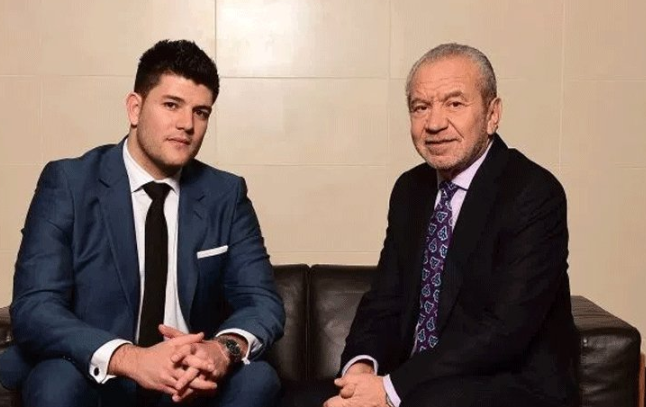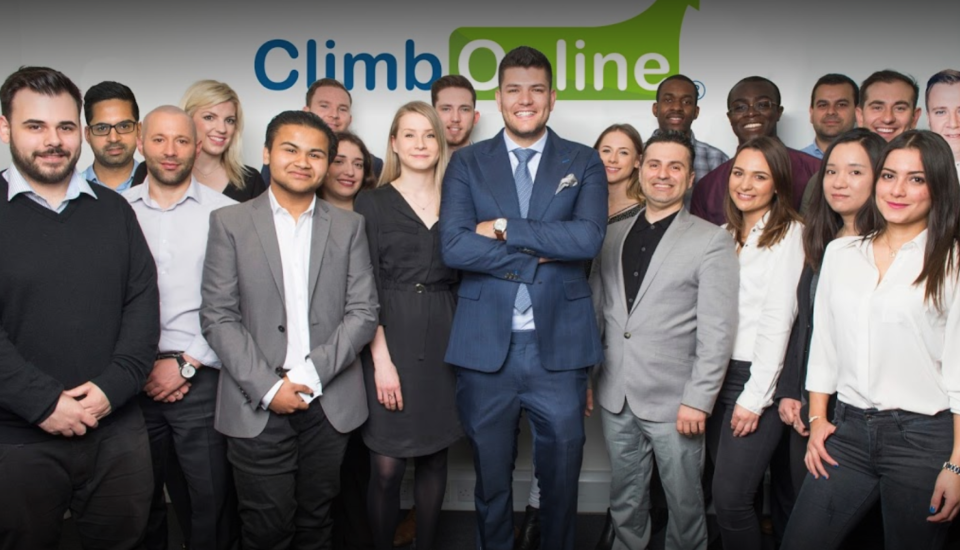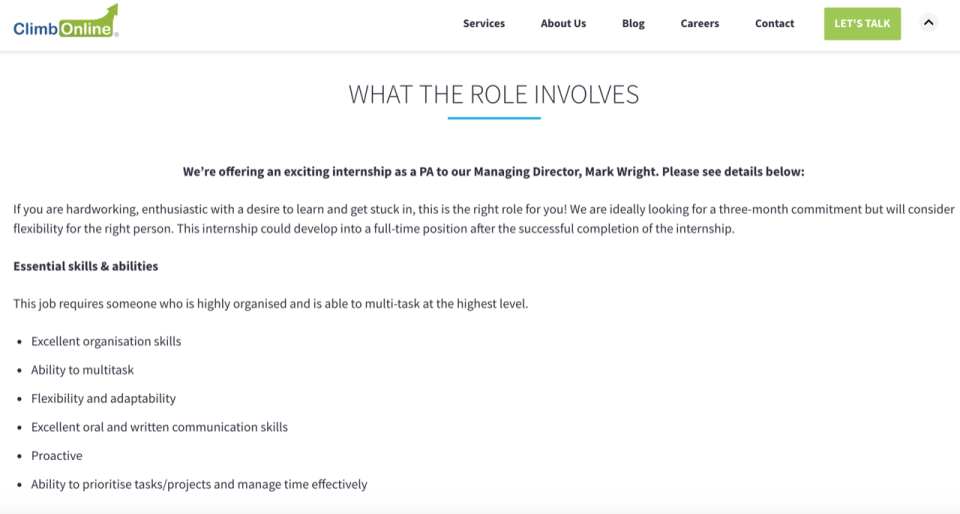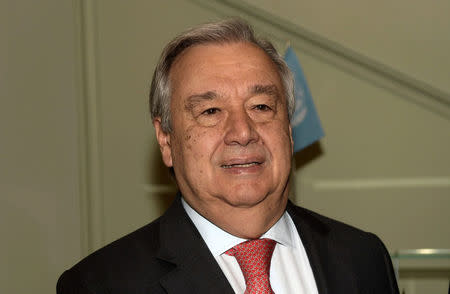Apprentice or Intern: the high-profile companies getting young Britons to work for free

Why are long-term unpaid internships still flourishing? The Bureau of Investigative Journalism and Yahoo Finance UK present a snapshot of unpaid internships advertised on one day in the UK by companies including TV Apprentice winner Mark Wright, Harvey Nichols and the UN. By Jane Haynes
Are you multi-skilled, hard working, enthusiastic, flexible?
Want to work for winner of TV show The Apprentice Mark Wright’s company, Climb Online? You would be managing his diary, greeting clients, working on projects for up to three months. You will also get “a once in a lifetime opportunity to work for Lord Sugar”.
So far, so good. The downside? There’s no money in it.
Unpaid internships remain a reality in modern Britain, despite campaigners’ efforts to make
companies pay interns or stop the practice. Concerns have been raised that some internships may potentially breach minimum wage regulations.
To get an idea of how widespread the practice is, the Bureau conducted an in-depth search of prominent job websites on a single day – May 8 – to get a snapshot of the type of businesses that explicitly offer unpaid work.
As well as Climb Online, other high-profile organisations included the UN, Harvey Nichols, and respected think-tank Chatham House. Many of the positions were for three months or more, with the longest being one year.
On the day of the search, we found a total of 1,650 internships advertised across five popular job sites. Among them were 103 ads (from 58 employers) seeking unpaid interns.
Many of the ads suggested the intern would have a high level of responsibility: ‘in charge’, ‘PA to the managing director’, the ‘right hand of the creative director’. Other ads were looking for ‘extraordinary talent’, or ‘wizardry level design skills’.
Of those that specified the length, the majority – 67 out of 103 – were for three months. Four were for a whole year.
Nearly all of the adverts indicate that no wages are being offered. Yet many of the jobs involve working set hours, often full-time or four days a week, and performing a list of duties and roles. This significantly favours well-off candidates who can afford to work for free, usually funded by parents or from other sources of income.
Apprentice or intern?
Around 70,000 internships are offered in the UK each year.
Among the advertisers looking for unpaid staff on the day of the Bureau’s data search and analysis was Climb Online, the digital recruitment company set up in 2015 by Mark Wright, winner of The Apprentice, in partnership with Lord Sugar.



The firm says it turned over £4m in its second year of trading, making Wright the most successful winner of the BBC series to date.
Last month Climb Online was advertising for an unpaid full-time personal assistant to support Wright in running the business – including organising his diary, hosting visitors and working on projects – for up to three months. The advert also promised candidates a “once in a lifetime opportunity” to work with Lord Sugar, the firm’s co-owner.
Lord Sugar, however, has expressed very different views about such unpaid roles. In response to a 2011 campaign called Pay Your Interns, his office confirmed that: “none of Lord Sugar’s companies employ unpaid interns.”
Employment rights and tax specialist Jolyon Maugham QC, director of the Good Law Project, said he would be concerned that, if the Climb Online unpaid post was filled according to the terms advertised, such internships could be in contravention of minimum wage regulations.
After repeated requests to comment on our findings, the only response we received from Climb Online was: “I am afraid Mark is booked up for the next few weeks and will unfortunately not be able to participate in this.”

Lord Sugar’s spokesman said: “Lord Sugar is not aware of the specifics of what you are claiming; however, to his knowledge, Climb Online are following industry best practices. Lord Sugar does not condone anything that is exploitative or unfairly discriminates in any way.”
Since our inquiry, the advert has been removed from the company’s website. However, the
full details can be seen here.
The findings have infuriated campaigners. Dr Lee Elliot Major, chief executive of the Sutton Trust, a foundation which campaigns to improve social mobility, said in response to the findings: ‘No one should have to work for free to get ahead in life… Not only is this a major barrier to social mobility, but, by only recruiting from a small social pool, these firms are missing out on potential talent too.’
UNfair?
The United Nations has a highly sought internship programme for recent graduates.
A total of 23 United Nations internships from around the world were being advertised in the UK on Indeed.co.uk on the day of our investigation – but none of them including any pay or expenses, including medical insurance and living expenses of those moving abroad.
Full details are still on the UN’s website, with positions all over the world, all subject to the same conditions.

In response, the UN stated that it’s internship programme “was designed to provide an educational/professional experience to university students or recent graduates worldwide. It is not there to provide ‘unpaid’ labour for the UN. Interns are not supposed to do work normally done by paid staff”.
Maugham commented: ‘It is pretty deplorable that an organisation like the United Nations
should deny access to opportunities to those who cannot afford it. The child of a banker or
commercial lawyer may be able to take up these opportunities; most people would not. If the
UN is genuinely trying to create a world where opportunity is open to everybody then this
practice does the opposite.’
Changing policy
In contrast to the UN, Chatham House, the highly respected policy think-tank based in London, has committed to ending unpaid internships by the end of the year. During our analysis we discovered two job adverts for unpaid internships there, each lasting three months. But the think-tank told the Bureau that following a review it is phasing them out.
Passion for fashion
Department store Harvey Nichols’s internship scheme aims to “inspire people to stand out and be unique”. During the programme, which runs for three or six months, interns are based at the company’s head office in Chiswick, London. All of the positions are unpaid. On our day of search, it was advertising for a marketing intern.
In a statement Harvey Nichols said: “Our policy is to only accept interns who are in full time education studying a relevant qualification, except in exceptional cases. The intern’s time is spent following a structured programme and in job shadowing the relevant people or departments. No work is carried out by the interns.”
Other adverts included ones seeking “a hip young gunslinger” who “lives and breathes social” (for a concert listings company); a graduate who could be “the right hand of the creative director” at a London fashion house; and a HR specialist who would be “in charge of hiring talent” at a fitness company.
‘Just apply’

A three-month internship with BMA Models and Talent Agency in London urges you to ‘just apply’ if you are a keen photography or marketing graduate. In exchange for expenses only, candidates will be working full-time to update websites with images, organise test shoots, book models, edit commercials and showreels, update the database and perform general admin duties. We contacted BMA Models and Talent Agency about their internships but they declined to respond.
Beautiful game?
The English Schools Football Association, based in Staffordshire, was advertising for two interns to each carry out a year-long, unpaid internship. The adverts, targeting graduates, suggested the internships may turn into full time roles, but this was not guaranteed. We offered the organisation the opportunity to respond but this was declined.
The legal situation
The Government clarifies the position of interns on its website in a section called
Employment Rights for Interns.
It states: “An intern’s rights depend on their employment status. If an intern is classed as a worker,
then they’re normally due the National Minimum Wage. Internships are sometimes called work placements or work experience. These terms have no legal status on their own. The rights they have depend on their employment status and whether they’re classed as: a worker; a volunteer; or an employee. If an intern does regular paid work for an employer, they may qualify as an employee and be eligible for employment rights.”
There are provisions to allow for unpaid internships for school and college students, for work shadowing, and for voluntary help for a charity.
A HMRC spokeswoman confirmed there had been no prosecutions to date of employers offering unpaid internships. However, she added that HMRC officers routinely contact employers who advertise unpaid internships, signposting them to guidance to help ensure they are compliant.
If anyone thinks they are not receiving at least the minimum wage, they can contact Acas, in
confidence, on 0300 123 1100 or submit a query online on GOV.UK.
A Private Member’s Bill by Lord Holmes and Alec Shelbrooke goes before the House of Commons later this year, calling for a prohibition on unpaid work that lasts longer than four weeks.
Lord Holmes said: “Unpaid internships leave young people in a Catch-22 situation; unable to get a job because they haven’t got experience and unable to get experience because they can’t afford to work for free. The situation clearly advantages those already advantaged enough to be in a position to work for free.”
According to the Social Mobility Commission, a four-week limit is supported by two-thirds of businesses, including KPMG, PwC, AXA, and Pimlico Plumbers. Employer groups including the Institute of Directors and the Arts Council also oppose long term unpaid internships. The Government’s Social Mobility and Child Poverty Commission, the Sutton Trust and the Social Mobility Foundation all support the introduction of a four week limit.
Lord Holmes said during the bill’s first reading: “More and more professions and trades now require not only a degree and a vacation scheme, but unpaid work experience if someone is to have any hope of getting a job.”
Supporting the Bill at an earlier reading in 2016, Conservative MP Alec Shelbrooke spoke of the inequality engendered in unpaid internships.
“[This bill] sets about bringing an end to a new rise in the class society that means only those from a wealthy background can gain a privileged leg-up with an unpaid internship in their chosen profession.”
You can read the full article on the Bureau of Investigative Journalism.

 Yahoo Finance
Yahoo Finance 